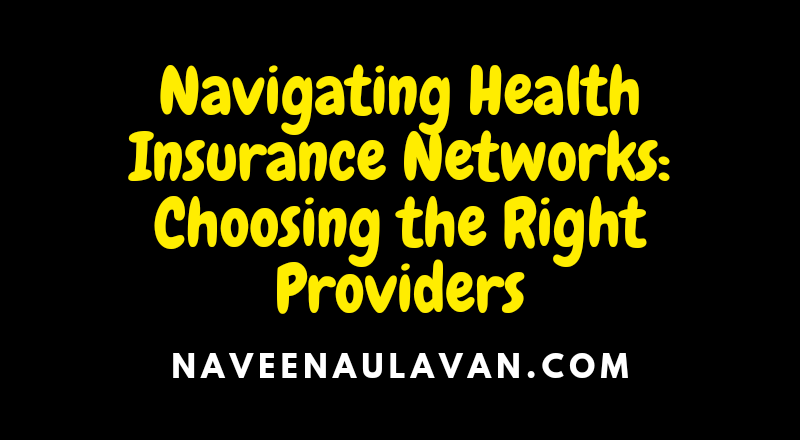Choosing the right health insurance provider is a critical decision that can have a significant impact on your overall healthcare experience. One crucial aspect to consider is the provider network. Health insurance networks consist of doctors hospitals pharmacies and other healthcare professionals and facilities that have agreed to provide services at negotiated rates to members of a specific insurance plan. Navigating these networks can sometimes be confusing but with the right information and understanding you can make an informed decision that meets your healthcare needs. In this article we will explore the different types of health insurance networks discuss their pros and cons and provide valuable tips for selecting the right providers within these networks.
Types of Health Insurance Networks
When selecting a health insurance plan it’s essential to understand the different types of networks available. Here are the three main types:
1. Preferred Provider Organization (PPO)
PPOs are one of the most common types of health insurance networks. They provide you with the flexibility to receive care from both in-network and out-of-network providers. In-network providers have contracted with the insurance company to provide services at discounted rates while out-of-network providers have not. However keep in mind that the out-of-pocket costs for out-of-network services are typically higher than in-network services.
Pros of PPO networks:
– Flexibility to see any doctor or specialist without referrals.
– No need to choose a primary care physician.
– Ability to see out-of-network providers though at a higher cost.
– Less administrative hassle compared to Health Maintenance Organization (HMO) plans.
Cons of PPO networks:
– Generally higher monthly premiums compared to other network types.
– Out-of-pocket costs such as deductibles and copayments may be higher for out-of-network services.
– The potential for balance billing where an out-of-network provider can bill you for the remaining amount the insurance company does not cover.
2. Health Maintenance Organization (HMO)
HMO networks typically require you to choose a primary care physician (PCP) who acts as a gatekeeper for your healthcare needs. If you need to see a specialist you must obtain a referral from your PCP. These plans generally do not cover out-of-network services except in emergencies or with prior authorization.
Pros of HMO networks:
– Generally more affordable monthly premiums compared to PPOs.
– Lower out-of-pocket costs such as copayments and deductibles.
– Coverage for preventive care and wellness programs.
Cons of HMO networks:
– The need for a PCP referral to see specialists which can delay access to care.
– Limited provider choices as you can only see doctors and specialists within the network.
– No coverage for out-of-network services except in emergencies.
3. Exclusive Provider Organization (EPO)
EPO networks are a hybrid between PPOs and HMOs. They offer the flexibility to see any doctor or specialist within the network without requiring a PCP referral. Like HMOs EPOs typically do not provide coverage for out-of-network services.
Pros of EPO networks:
– Cost-effective monthly premiums compared to PPOs.
– No need to select a primary care physician or obtain referrals.
– Wide range of in-network providers for increased choice.
Cons of EPO networks:
– No coverage for out-of-network services except in emergencies.
– Limited provider choices compared to PPOs.
Factors to Consider When Choosing Providers
Once you have determined the type of health insurance network that suits your needs it’s important to select providers within that network that meet your healthcare requirements. Here are some key factors to consider:
1. Provider Network Size and Coverage
Consider the size of the provider network and whether it covers the geographic areas where you live work and frequently travel. Larger networks offer more choices and increased access to care which can be advantageous when seeking specialized services or second opinions. However smaller networks might provide more personalized care and shorter wait times for appointments.
2. Provider Specialty and Expertise
Check if the network includes providers with the specialties and expertise you require. If you have a specific condition or need specialized care ensure that the network offers a range of doctors hospitals and specialists in that field. Look for providers who have experience and a good reputation in treating your particular health issues.
3. Quality of Care
Research the quality of care provided by the network’s providers. Look for information on patient outcomes accreditation patient satisfaction ratings and any disciplinary actions taken against providers. Online resources like government websites consumer advocacy groups and patient reviews can provide helpful insights into the quality of care offered by different providers.
4. Convenience and Accessibility
Consider the location and operating hours of providers in the network. Choose providers who are conveniently located ensuring that you can access care easily when needed. Also check if providers offer alternative options such as telehealth consultations which can be beneficial for routine check-ups or minor illnesses without the need for an in-person visit.
5. Prescription Drug Coverage
If you regularly take prescription medications it’s important to review the network’s coverage for these drugs. Check if your medications are included in the network’s formulary and if there are any restrictions or additional costs associated with them. Ensure that the network’s pharmacies and mail-order services are easily accessible to meet your prescription needs.
Conclusion
Navigating health insurance networks can seem daunting but by understanding the different types of networks and considering key factors when choosing providers you can make an informed decision that aligns with your healthcare needs. Carefully evaluate the provider network’s size and coverage provider specialties and expertise the quality of care convenience and accessibility and prescription drug coverage. Remember selecting the right providers within your insurance network can significantly impact your overall healthcare experience and ensure you receive the care you need when you need it.
